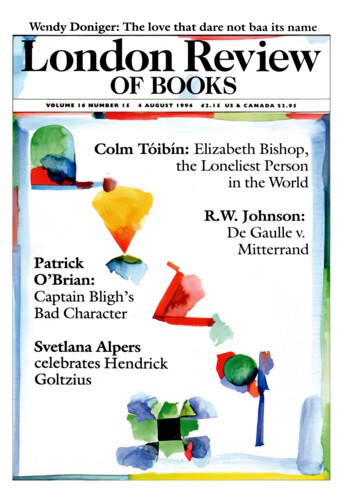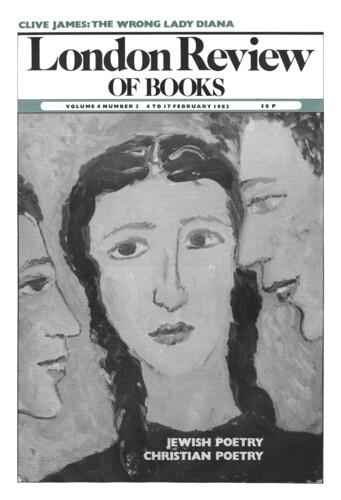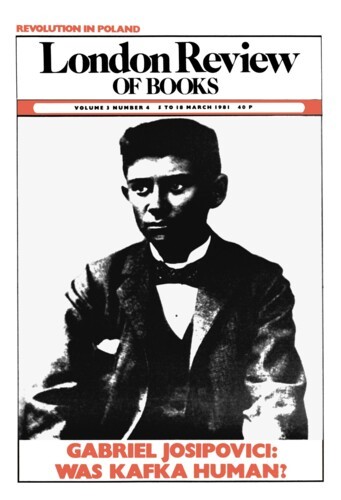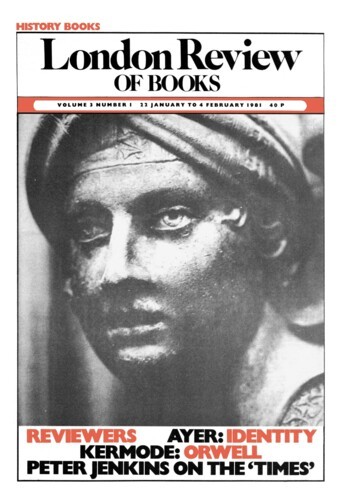Christopher Hill
Christopher Hill is the author of The Century of Revolution and Some Consequences of the English Revolution. The Ancient Historian Fergus Millar will also write about G.E.M. de Ste Croix’s book in a later issue of this paper.
Ancient Exploitation
Christopher Hill, 4 February 1982
This is a powerful book, which should be read by all ancient historians and all Marxists. It will not please the orthodox in either group. Dr de Ste Croix has evolved his own personal brand of Marxism, though he relates it carefully to Marx’s own works, and he gives short shrift to his Marxist predecessors in the field. George Thomson, whose Aeschylus and Athens excited me very much when it came out in 1940, is dismissed in three curt sentences. But Dr de Ste Croix is no less critical of his fellow Classical historians, among whom he commonly refers favourably only to A.H.M. Jones and P.A. Brunt. Sir Moses Finley is rarely mentioned except to be criticised.
Full-Employment Utopias
Christopher Hill, 16 July 1981
Dr Davis’s book is a long, careful and detailed study of utopian writing in England from Sir Thomas More to the end of the 17th century. He has interesting things to say about well-known figures like More, Bacon, Winstanley and Harrington, but I found his chapters on lesser writers even more instructive. Robert Burton and Samuel Gott are revealed as more significant ‘utopians’ than has been recognised. Dr Davis is also interesting on William Sprigge’s A Modest Plea for an Equal Commonwealth of 1659, the anonymous Chaos (1659) and The Free State of Noland (1696), which he classifies as ‘Harringtonian’. He has even found a couple of Royalist utopias, which he discusses in Chapter Ten. More important, he distinguishes a category of ‘full-employment utopias’, which includes Rowland Vaughan (1610), Gabriel Plattes’s Macaria (1641), Peter Chamberlen’s The Poore Mans Advocate (1649), Peter Cornelius Plockhoy (1659), John Bellers’s Proposals for Raising a College of Industry (1695), and two essays by an anonymous Hermeticist, Philadept, published in 1698 and 1700. Many in this last group were discussed in 1952 by J.K. Fuz in a pioneering work, Welfare Economics in English Utopias, to which Dr Davis refers only in a dismissive footnote. Davis also shows that Burton was an early advocate of something like a welfare state.
Good History
Christopher Hill, 5 March 1981
Professor Hexter made his mark in the learned world over forty years ago with an article in the American Historical Review called ‘The Problem of the Presbyterian Independents’. He pointed out that many members of the Long Parliament whom historians had traditionally labelled ‘Independents’ were appointed elders of the Presbyterian Church set up in 1645-8, and that many ‘Presbyterians’ sat in the Rump of the Long Parliament, which used to be described as ‘Independent’. To upset so many apple-carts in so short a space must have given him great pleasure: since his article no responsible historian has ever dared to use the labels ‘Presbyterian’ and ‘Independent’ in the old carefree way. Three years later followed The Reign of King Pym, a masterly study of Parliamentary politics during the early years of the English Revolution which has dominated historical thinking ever since. In 1952, he published More’s Utopia: The Biography of an Idea, a competent but not epoch-making work. Since then he has published no single full-length work of historical research. The editor of the volume under review says that ‘for over thirty years … he has served as the conscience of his fellow scholars’. He has written books with titles like Doing History and The History Primer.
Counting signatures
Christopher Hill, 22 January 1981
This is the first full-scale study of literacy in 16th and 17th-century England. Dr Cressy has long been known to scholars for his work on the subject: here he gives us his conclusions. For the whole of his period, he thinks, about two out of three adult males, and about 90 per cent of women, were illiterate. Proportions varied from region to region. In London by the end of the 17th century illiteracy may have been down to two-thirds or a quarter; for women about a half. There were fluctuations over time: a rapid growth in literacy immediately after the Henrician Reformation and again in the early years of Elizabeth’s reign; a recession from 1580 to 1610, and again in the Civil War decade, followed by a new advance in the 1650s, and a slowing down after 1660. The initial rapid rise may perhaps be attributed to a new emphasis on Bible-reading; the other fluctuations probably derive from economic factors – though the stagnation after 1660 must relate to the upper-class feeling that the revolutionary decades had shown that too much education was bad for the lower orders.
Pieces about Christopher Hill in the LRB
Rolodex Man
Mark Kishlansky, 31 October 1996
It is becoming difficult to remember how influential Christopher Hill once was. When E.P. Thompson dedicated Whigs and Hunters to ‘Christopher Hill – Master of more than an old Oxford...
Playgoing
Donald Davie, 27 May 1993
The Seventh Psalm is required in the Book of Common Prayer to be sung or said, in Miles Coverdale’s version, on the evening of Day One of the Church’s calendar: God is a righteous...
Danger-Men
Tom Shippey, 2 February 1989
Christopher Hill has shown literary critics the way before now. Many must have felt at least mildly chastened by his remarks in Milton and the English Revolution (1977), no less forceful for...
History and the Left
Jonathan Haslam, 4 April 1985
In 1977 E.H. Carr completed his 14-volume History of Soviet Russia. He had embarked on an intellectual day excursion but found himself on a major expedition through a dark continent of knowledge....
Losers
Conrad Russell, 4 October 1984
The point Mr Hill makes in his title is one he has made before, yet it bears repetition. By 1660, and in many cases before, the radical causes which make the middle of the 17th century such an...
Rescuing the bishops
Blair Worden, 21 April 1983
The publication of Patrick Collinson’s The Religion of Protestants is a stirring event in the rediscovery of Early Modern England. Unmistakably the work of a historian who has reflected on...
Winner’s History
Howard Erskine-Hill, 20 August 1981
Some great and some good things, and some both great and good, undoubtedly came out of the period 1640-60 which Christopher Hill calls ‘the English Revolution’. What came out,...
Read anywhere with the London Review of Books app, available now from the App Store for Apple devices, Google Play for Android devices and Amazon for your Kindle Fire.
Sign up to our newsletter
For highlights from the latest issue, our archive and the blog, as well as news, events and exclusive promotions.





